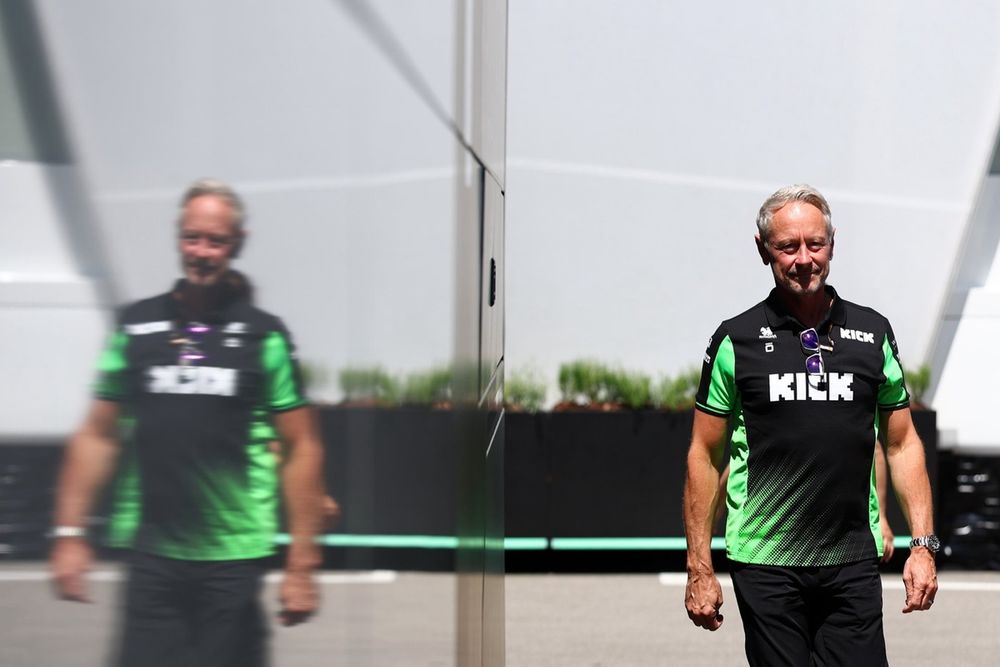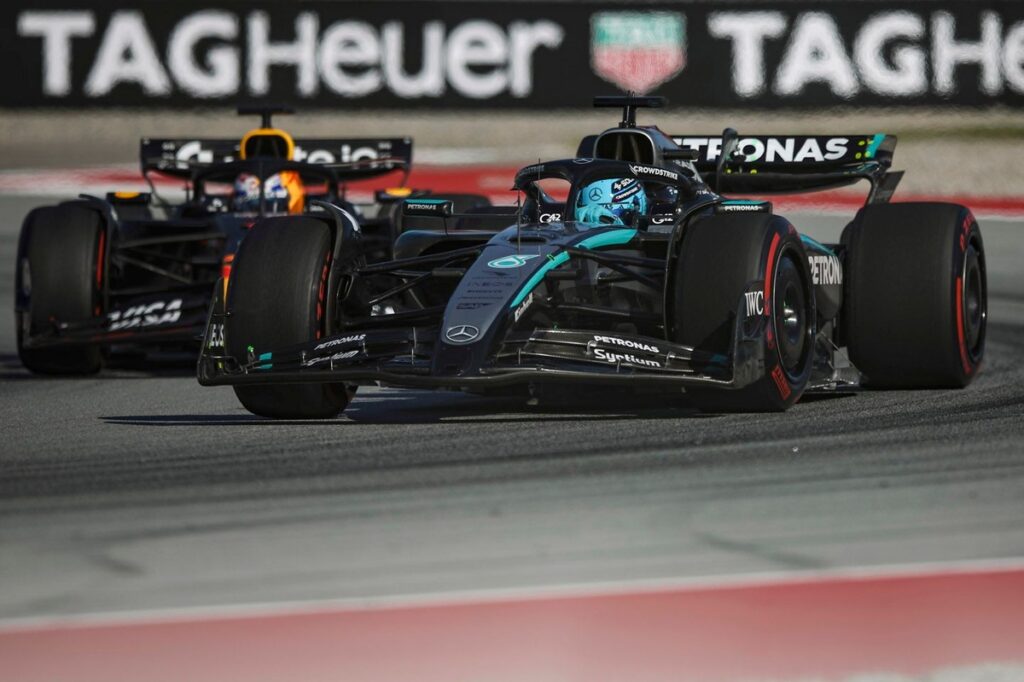The dust has settled – on track at least – and Max Verstappen has accepted his collision with George Russell at the Formula 1 Spanish Grand Prix was “not right”. But questions remain over Red Bull’s interactions with FIA race control, which appear to have had a substantial influence on the trigger point for the incident.
After the Safety Car restart Verstappen was aggrieved that the team had put him on the unfancied C1 hard-compound tyre, and he felt he had been hit by Charles Leclerc and then pushed off the track by Russell. Since the FIA’s signalling system indicated that Verstappen was ‘under investigation’ for leaving the track and gaining an advantage, having taken to the escape road and rejoined ahead of Russell, Red Bull instructed him to give the position back.
This sequence of events, Verstappen admitted in a social media post, “fuelled my frustration, leading to a move that was not right and shouldn’t have happened”.
In the immediate aftermath, Red Bull team principal Christian Horner complained that there was no response from race control when the team queried whether Verstappen should concede track position. Essentially, he claimed, it was left to its own devices to make the call.
“You’ve asked for guidance from the FIA, from the referee,” he said. “Essentially, there’s nothing come back.
“You can see that it’s been reported. It’s going to the stewards. It looked for all intents and purposes that it was going to be a penalty, so therefore the instruction was given to Max to give that place back.”
George Russell, Mercedes, Max Verstappen, Red Bull Racing
Photo by: Malcolm Griffiths / Formula 1 via Getty Images
In fact, the official document outlining the stewards’ reasoning for handing Verstappen a penalty (10 seconds added to his race time and a three-point endorsement) for the Turn 5 collision made it clear that they would not have taken action against him for rejoining ahead of Russell. Another document detailing the events at Turn 1, where Russell dived up the inside to pass Verstappen, noted that the Mercedes driver briefly lost control having got far enough ahead to have the ‘right’ to the corner, and it was this which caused Verstappen to go off-track.
Horner was asked during his post-race briefing whether, in hindsight, the team had made a mistake in ordering Verstappen to give up the place, given that the stewards’ ultimate finding on his departure from the track was ‘no further action’.
This is a classic example of the historian’s fallacy, in which decisions are analysed based on present knowledge of the outcome rather than what was known at the time, but Horner’s response bears repeating.
“Yeah, but I think that’s where it would be nice, as the referee, as a race director, to either say ‘play on’ or ‘you need to give it back’,” he said.
“It’s very hard for the team, subjectively, to try and make that call, because you’re going on historical precedents. You’re looking at what you have in front of you and you’re trying to pre-empt what the stewards and the race directors are thinking.”
The most recent moment of precedent involving Verstappen going off and being investigated for gaining advantage was on the first lap of the Saudi Arabian GP this year. But in that race there was no contact and Verstappen was adjudged to have gone off by himself, securing track position in doing so.
“I think it would be beneficial to the teams, in that instance,” continued Horner, “for the race director to make that call and say ‘you either give it back or you get a penalty’, rather than having to try and second-guess what the stewards are going to think.

Christian Horner, Red Bull Racing
Photo by: Red Bull Content Pool
“I used to get some guidance, but now it’s very subjective for the team to make that call.
“So we looked at all the slow-mos and it was really 50-50. Is George under control of the car? Would he have made the corner? It looked like he would have made the corner. So you make the call to say, look, we need to give this place up.
“I think that what would be great is if, as I say, if the race director in that situation takes responsibility and says either effectively ‘play on’ or ‘you’ve taken advantage, you need to give up the advantage’.
“So that then gives the team a choice. But trying to second-guess what the stewards may or may not think is bloody difficult in the midst of it.”
Sauber team principal Jonathan Wheatley took a different view – and this is interesting because not only was he Red Bull sporting director until last year, so he has vast experience of being ‘point man’ with race officials, but one of his own drivers was investigated for leaving the track and gaining an advantage.
Nico Hulkenberg attracted attention by going from 16th to 11th place on the opening lap, then passing Fernando Alonso’s Aston Martin for 10th on his way to sixth on the road at the chequered flag (fifth once Verstappen’s penalty was applied). In fact he had simply made a good launch, gaining three places before Turn 1, then was in the process of passing Liam Lawson’s Racing Bulls car around the outside into Turn 2 when he was squeezed off.
Thus he could stake a claim for being entitled to 12th, then gained a further net position as Alex Albon’s Williams slowed with a damaged front wing.

Jonathan Wheatley, Team Principal, Sauber
Photo by: Andy Hone / Motorsport Images
“The teams have the option to read the situation and do it [order drivers to hand places back] themselves,” said Wheatley.
“We had a really good look at what happened in Turn 1 [with Hulkenberg]. If we’d been in any doubt, we might have handled the situation differently but we were very confident of where we were.
“So look, I think I’ve gone on record before saying I think stewarding has come on enormously recently. I think the FIA are doing a really good job with that.
“But it’s a work in progress. I still don’t think I’ve seen two overtaking manoeuvres which are the same.
“I’ve taken an awful lot of time, over the 19 years I was a sporting director and working with the FIA, to try to really understand the pressures they have in race control. Walk a mile in their shoes as well. It’s not always the case that that’s the only incident they have to look at. There’s a lot sometimes, especially after a first lap.
“I don’t know the specifics of what Christian wanted to talk about. I didn’t really follow his race as much as I followed ours.
“But like I say, I’ve spent a long time trying to understand the pressures in race control and trying to understand whether I’m going to get an answer or not.”
In this article
Stuart Codling
Formula 1
Max Verstappen
George Russell
Red Bull Racing
Mercedes
Be the first to know and subscribe for real-time news email updates on these topics
Subscribe to news alerts
Read the full article here

